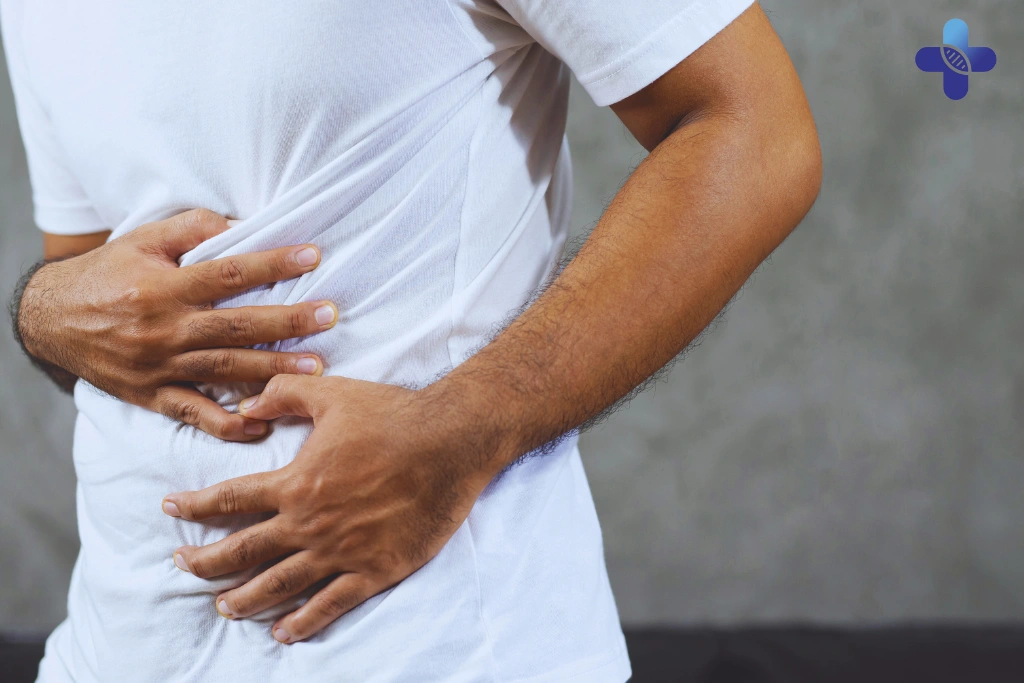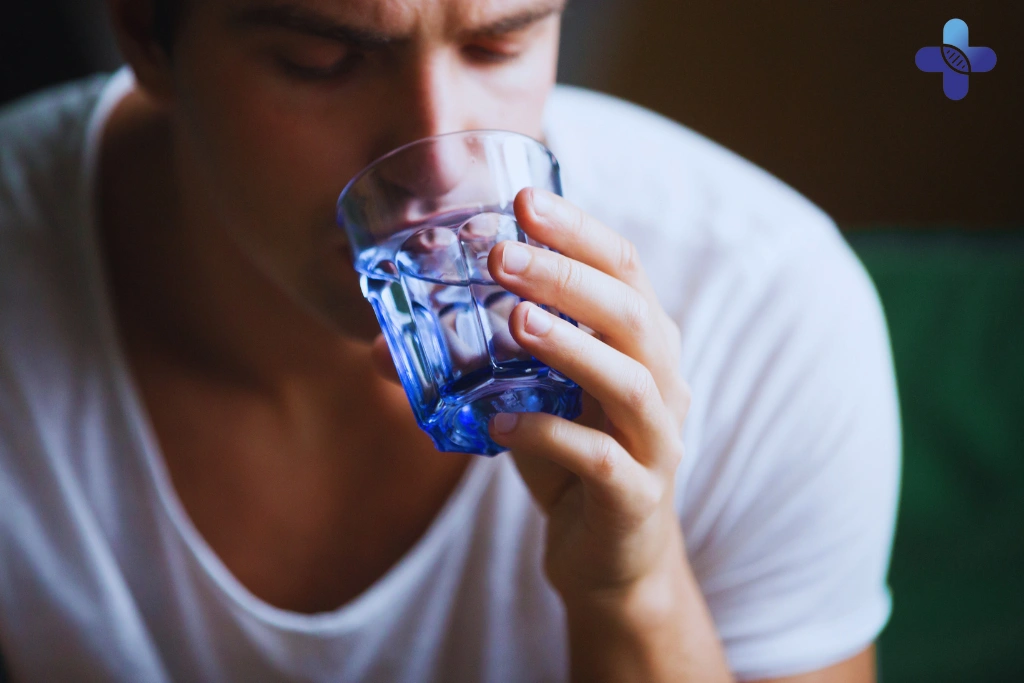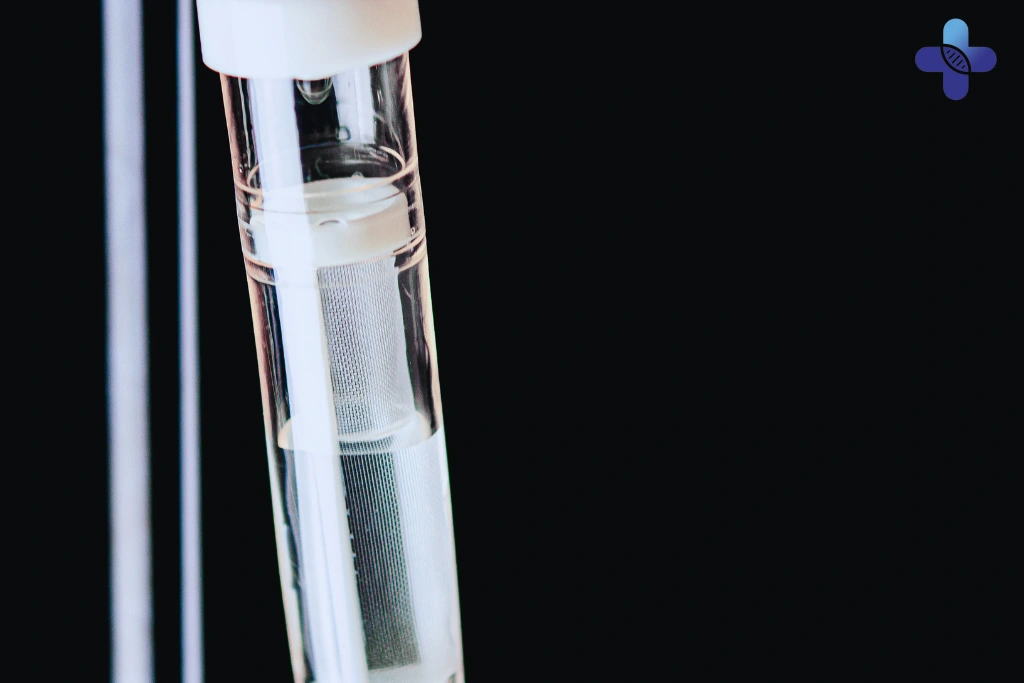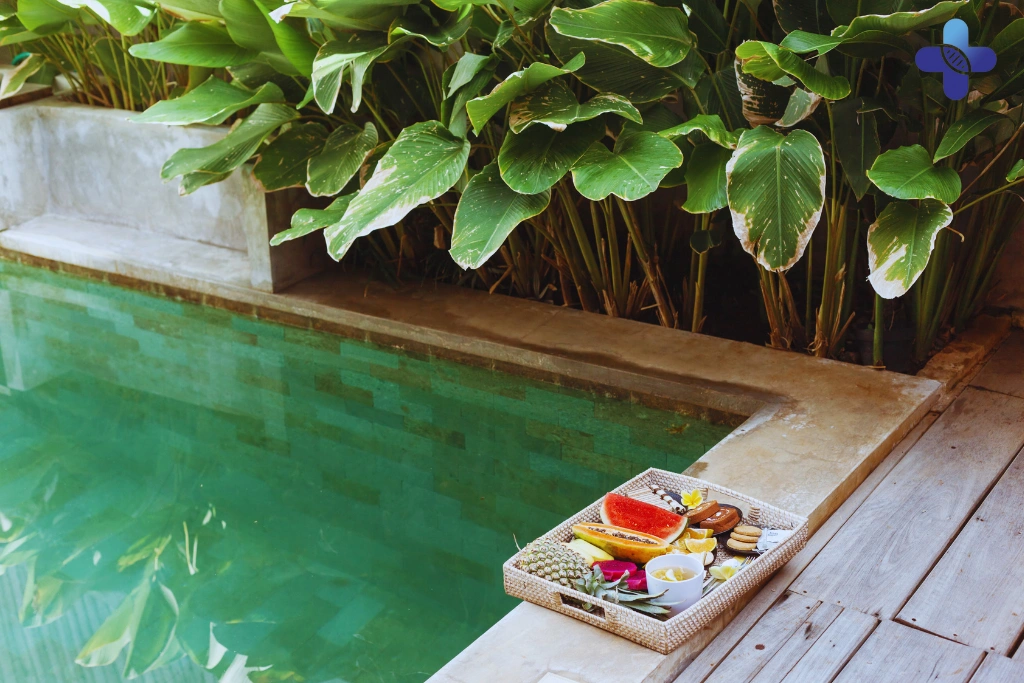Dehydration from diarrhea in Bali is a serious medical concern that often goes unnoticed until symptoms become severe. Travelers dealing with Bali Belly may dismiss early signs like fatigue or dizziness, unaware that rapid fluid loss can lead to dangerous complications. At Life Everyouth, a trusted Medical Clinic in Bali, we often see patients whose condition escalated simply because they didn’t know when to seek help. This guide explains the real risks of dehydration from diarrhea, the symptoms you must watch for, and the proven treatments—including IV hydration—available at Life Everyouth Bali, your reliable Bali Medical Clinic.
Dehydration from Diarrhea in Bali: A Doctor’s Guide to Symptoms & Treatment

Traveler’s diarrhea is more than just an inconvenience—it’s a real medical threat when dehydration starts to take over. In Bali, where hot weather, unfamiliar food, and travel stress collide, dehydration from diarrhea can progress quickly, especially if you’re dealing with Bali Belly. At Life Everyouth Bali, we regularly treat visitors whose mild symptoms escalate into dizziness, weakness, and even confusion. As a trusted Medical Clinic in Bali, we want you to recognize the signs early and act fast. Understanding what dehydration from diarrhea looks like, how severe it can get, and when to seek medical help is crucial for staying safe while traveling. If you’re worried that your symptoms might be more than just a stomach bug, this guide is for you.
Why Diarrhea Causes Dehydration So Quickly
When you’re dealing with diarrhea, your body loses more than just water—it also rapidly expels vital electrolytes like sodium, potassium, and chloride. These substances are essential for maintaining fluid balance, nerve function, and muscle activity. In tropical climates like Bali, where you’re already sweating more than usual, this loss can become dangerous very quickly. At Life Everyouth Bali, we’ve treated countless cases of travelers who underestimated how fast mild symptoms could escalate into dehydration. As a leading Medical Clinic in Bali, we stress the importance of understanding that the risk isn’t just the diarrhea itself, but the rapid fluid and electrolyte imbalance it causes.
Even if you’re drinking water, it might not be enough. Without replacing lost electrolytes, the water you drink may not be properly absorbed or retained. That’s why our Bali Medical Clinic always assesses both hydration and electrolyte levels in patients with traveler’s diarrhea. Recognizing the mechanism behind this rapid loss is the first step in protecting yourself from dehydration during your stay.
The 3 Stages of Dehydration: A Symptom Checklist

At Life Everyouth Bali, we guide patients to recognize the signs of dehydration early—before they escalate into critical conditions. Dehydration from diarrhea follows a clear pattern, progressing from mild to moderate and finally to severe. Understanding which stage you’re in helps you determine whether self-care is enough or if you need urgent medical support. As a leading Medical Clinic in Bali, we strongly recommend monitoring your symptoms consistently, especially while recovering from Bali Belly.
Each level of dehydration from diarrhea carries different risks and treatment approaches. At Life Everyouth, we aim to empower you with a symptom checklist so you know when to act. Whether it’s drinking ORS at the right time or receiving IV fluids at our Bali Medical Clinic, early response can make all the difference during your stay in Bali.
Mild Dehydration
Mild dehydration is often the first red flag, yet it’s frequently ignored. You may notice increased thirst, dry lips or mouth, and a slight reduction in urination. Urine may turn pale yellow instead of clear, and you might feel a bit tired or light-headed. These symptoms are your body’s early warning that fluid and electrolyte levels are dipping. At this stage, oral hydration using ORS (oral rehydration salts) is effective.
At Life Everyouth Bali, we often recommend travelers keep ORS sachets handy—especially when spending time under the sun or experiencing Bali Belly symptoms. Our Medical Clinic in Bali frequently educates patients about how dehydration from diarrhea can worsen rapidly if mild signs are ignored. The sooner you address early dehydration with proper fluids and electrolytes, the better your chances of avoiding more severe complications.
Moderate Dehydration
Moderate dehydration means your body is struggling to keep up. Common symptoms include dizziness when standing, ongoing headache, dark or orange-colored urine, fatigue, dry skin, and difficulty concentrating. This stage often follows multiple episodes of diarrhea, especially when accompanied by vomiting. Simply drinking water may not be enough, as your gut might not absorb fluids efficiently due to intestinal inflammation or nausea.
At Life Everyouth, we view moderate dehydration from diarrhea as a clear signal for medical intervention. Our Bali Medical Clinic provides on-site assessment and intravenous hydration for cases like these. We’ve seen patients recover quickly after an IV drip session, which restores fluid balance far more efficiently than oral intake alone. If you’re feeling drained, weak, and unable to keep fluids down, don’t wait—let Life Everyouth Bali help you recover safely.
Severe Dehydration
Severe dehydration is a medical emergency. Symptoms include rapid heart rate, shortness of breath, confusion, dry eyes, inability to produce urine, and even fainting. At this stage, the body is dangerously low on fluids and essential electrolytes, compromising circulation, kidney function, and cognitive clarity. It’s a life-threatening condition that can develop within hours, especially in hot climates like Bali.
Life Everyouth Bali provides emergency response care both at our Medical Clinic in Bali and through our doctor-on-call service. Severe dehydration from diarrhea cannot be treated at home and must be addressed with IV fluid therapy immediately. Our medical team is trained to deliver rapid, sterile hydration with clinical precision. Don’t delay—if someone shows signs of severe dehydration, it’s time to act.
The Limits of Drinking: When Oral Rehydration Isn’t Enough
Drinking water or even ORS is often the first step when facing dehydration from diarrhea, but it isn’t always enough. In moderate to severe cases—especially when diarrhea is persistent or accompanied by vomiting—your digestive system becomes inefficient at absorbing fluids. The lining of the gut, already irritated by infection or inflammation, may not take in water and electrolytes fast enough to replace what’s being lost. This is why some patients feel worse despite drinking continuously.
At Life Everyouth Bali, we regularly treat visitors who assume they’re doing the right thing by drinking more, only to find their symptoms worsening. As a trusted Bali Medical Clinic, we explain that even the best oral hydration plan has its limits when the body is overwhelmed. Once nausea, dizziness, or weakness appear, it’s time to consider a more effective solution. Our Medical Clinic in Bali offers professional assessments to determine whether continued oral hydration is safe—or if IV treatment is necessary for recovery.
The Medical Gold Standard: Intravenous (IV) Hydration

When dehydration becomes moderate or severe, oral rehydration is no longer enough. The safest, fastest, and most effective way to restore your fluid and electrolyte balance is through intravenous (IV) hydration. An IV drip bypasses the gastrointestinal tract entirely, delivering a sterile saline solution directly into your bloodstream. This ensures immediate absorption and rapid recovery. At Life Everyouth, we use IV fluids enriched with electrolytes and optional vitamins to support your immune system and energy levels. As a leading Medical Clinic Bali, we rely on this gold-standard method for patients with persistent dehydration from diarrhea.
If you’re dizzy, weak, unable to drink, or still feeling unwell after oral hydration, your body likely needs more help. At Life Everyouth Bali, we offer Bali Belly Recovery IV Drip—a specialized treatment available at our Bali Medical Clinic or administered discreetly in your hotel. This therapy rapidly restores hydration, eases fatigue, and helps you bounce back safely. Don’t let your symptoms escalate into a medical emergency. Get professional medical help now with the most trusted rehydration solution in Bali.
Conclusion Dehydration from Diarrhea in Bali: A Doctor’s Guide to Risks & Treatment

Dehydration from diarrhea is not something to take lightly—especially in a tropical environment like Bali, where heat, travel fatigue, and dietary changes can amplify the effects. At Life Everyouth, we’ve seen how quickly mild symptoms can evolve into serious conditions when not treated promptly. By understanding the signs of dehydration from diarrhea and knowing when oral hydration is no longer enough, you can take control of your recovery. Whether you’re managing Bali Belly yourself or supporting a loved one who’s sick, early recognition is key.
At Life Everyouth Bali, our role as a trusted Medical Clinic in Bali is to provide immediate, reliable care with clinically proven solutions. From professional assessments to IV hydration therapy, we offer the full spectrum of medical support you may need. As a leading Bali Medical Clinic, we’re here to ensure your health doesn’t become another travel story gone wrong. Listen to your body, act early, and don’t hesitate to seek help when your symptoms feel beyond your control.
Frequently Asked Questions (FAQ) Dehydration from Diarrhea in Bali: A Doctor’s Guide to Risks & Treatment
How can I quickly check if I’m dehydrated?
The simplest method is to observe the color of your urine. If it’s dark yellow, amber, or has a strong odor, you are likely dehydrated. Your urine should be pale yellow, almost straw-colored, and frequent. At Life Everyouth Bali, we often use this quick check during triage at our Medical Clinic in Bali for early detection of dehydration from diarrhea.
How much water should I be drinking if I have diarrhea?
You should drink at least 250 ml of fluids for every episode of diarrhea, in addition to your regular daily intake. The best option is Oral Rehydration Solution (ORS), which replaces both fluids and electrolytes. Water alone isn’t sufficient if your body is losing minerals rapidly. At Life Everyouth, we always provide ORS recommendations during treatment at our Bali Medical Clinic.
Are sports drinks like Gatorade or Powerade good for rehydration from diarrhea?
While better than plain water, sports drinks still lack the balanced electrolyte formulation of ORS and often contain high sugar levels, which can worsen diarrhea. They’re acceptable in mild cases, but not ideal for medical rehydration. ORS is scientifically designed to be absorbed efficiently, even when the gut is irritated. At Life Everyouth Bali, we prioritize clinical-grade hydration over commercial alternatives in our Medical Clinic Bali protocols.
What are Oral Rehydration Salts (ORS) and why are they so important?
ORS is a precise mix of salts, glucose, and potassium that helps the intestines absorb fluids more efficiently. It’s especially critical during dehydration from diarrhea because it bypasses some of the absorption issues caused by intestinal irritation. Unlike sugary drinks or plain water, ORS maintains osmotic balance, allowing faster and safer rehydration. Life Everyouth provides ORS in every Bali Medical Clinic consultation for digestive issues.
Can you die from dehydration?
Yes. Severe, untreated dehydration from diarrhea, especially in tropical climates like Bali, can lead to organ failure, hypovolemic shock, and death. The danger is highest in children, the elderly, and individuals who delay seeking care. That’s why at Life Everyouth Bali, we emphasize early intervention through IV therapy at our Medical Clinic in Bali.
My heart is beating faster than usual. Is this related to dehydration?
Absolutely. A rapid heartbeat, or tachycardia, is your body’s response to low blood volume as it tries to compensate for lost fluids. It’s a classic sign of moderate to severe dehydration and should not be ignored. At Life Everyouth, we assess heart rate as a vital sign when treating travelers at our Bali Medical Clinic for dehydration from diarrhea.
How long does it take to rehydrate just by drinking water?
Rehydrating through oral intake can take 6–12 hours or more depending on the severity of the condition and your ability to retain fluids. If vomiting is present, it may be even longer or completely ineffective. This delay is why IV therapy is often necessary. At Life Everyouth Bali, we explain these timelines during every assessment at our Medical Clinic in Bali to help you choose the safest route to recovery.
How long does it take to rehydrate with an IV drip?
IV hydration delivers fluids directly into your bloodstream, allowing full core rehydration within 45–60 minutes in most cases. It bypasses the gut entirely, which is essential when the digestive system is compromised. Many of our patients feel significantly better within the hour. Our team at Life Everyouth Bali uses IV drips daily to treat dehydration from diarrhea quickly and safely in our Bali Medical Clinic.
Is the IV drip just salt water?
No. Medical IV fluids are sterile saline or Ringer’s lactate solutions that mimic your body’s internal chemistry. They are often fortified with electrolytes like potassium, magnesium, and sometimes vitamins to aid recovery. These solutions are designed for rapid absorption and physiological compatibility. At Life Everyouth, we use premium formulations in every IV therapy session at our Bali Medical Clinic.
If I feel better after the IV drip, does that mean I can stop drinking fluids?
Not at all. IV hydration is a fast reset, but your body will continue to need regular fluid intake to maintain balance. Once stabilized, continued sipping of ORS or water is crucial for long-term recovery. At Life Everyouth Bali, we always provide post-IV aftercare instructions during your visit to our Medical Clinic Bali, ensuring you stay hydrated as your digestive system heals.
